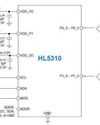
He delves into some of the most common options, such as adding a shift register, a multiplexer, or an I/O expander, along with a few less conventional approaches. You could have as much I/O as your heart desires yet some approaches come with cost, size and development time tradeoffs.
It seems like microcontroller memory just gets bigger and bigger, and often, it doesn't make a significant dent in program space. When I mention this to the players in the firmware game that have been doing this for a while, they are quick to say how lucky we 'youngins' are to have limitless memory so that even the most inefficient code can get the job done right.
And they are correct! I seldom need to optimize my code for limited program space. For speed, yes, I do sometimes need to be sensitive to certain places in my program, but not for the entire program space. Instead, I can focus on abstracting my program such that it has multiple layers of files that nearly anyone can read without a hassle.
Even when I'm developing small microcontroller projects, I typically use only a small part of the memory, while still maintaining the price point the product is supposed to hit.
But for the amount of I/O, this is a completely different story.
In fact, I often find myself needing more digital and even analog inputs and outputs. Sure, I could just upsize and get a bigger microcontroller, but this is rarely the solution, because the microcontroller seems to be locked down.
This story is from the {{IssueName}} edition of {{MagazineName}}.
Start your 7-day Magzter GOLD free trial to access thousands of curated premium stories, and 9,000+ magazines and newspapers.
Already a subscriber ? Sign In
This story is from the {{IssueName}} edition of {{MagazineName}}.
Start your 7-day Magzter GOLD free trial to access thousands of curated premium stories, and 9,000+ magazines and newspapers.
Already a subscriber? Sign In

Renesas New RA8 Entry-Line MCU Groups Brings High Performance of Arm Cortex-M85 Processor to Cost-Sensitive Applications with Market-Leading CoreMark Performance
Renesas Electronics Corp., a premier supplier of advanced semiconductor solutions, introduced the RA8E1 and RA8E2 microcontroller (MCU) groups, extending the industry's most powerful series of MCUs.

Same Sky Expands AMT Absolute Encoder Line to Support Larger Shaft Sizes
Same Sky's Motion & Control Group announced the addition of a new series to its innovative AMT absolute encoder family designed to support larger motor shaft sizes from 9mm to 15.875mm (5/8 inch).

XP Power Launches New Series of Low-Profile, Baseplate-Cooled DC-DC Brick Converters
The RDF150 and RDF200 series are the latest additions to the RDF series of low-profile, baseplate-cooled, ultra-wide input DC-DC brick converters, which is already available in power outputs of 25W and 50W.

HMI Introduces Ultra-Low Voltage 12-bit GPIO Expander with Interrupt Output
HMI, a leading provider of advanced analog and power management technologies, announced the launch of its HL5310, an innovative ultra-low voltage 12-bit GPIO expander featuring interrupt output.

The Future of Embedded Chip Design Navigating the Chip Creation Space
Custom Silicon at Lower Cost, Reduced Development Time

The Long and Winding Road
From Maxim's RS-232 to WeMos ESP32: So Much to Do, So Little Time

Start to Finish Driving LCDs
Lumex Display with Microchip Driver for a TI MCU

Easing the Path for App Releases
Managed Development of React Native with Expo

Datasheet: Tiny Embedded Boards
Deliver Power, Performance, and Versatility in Meager Square Millimeters

Harvesting Ambient Energy
Hybrid Power Sources Cut IoT Battery Dependency